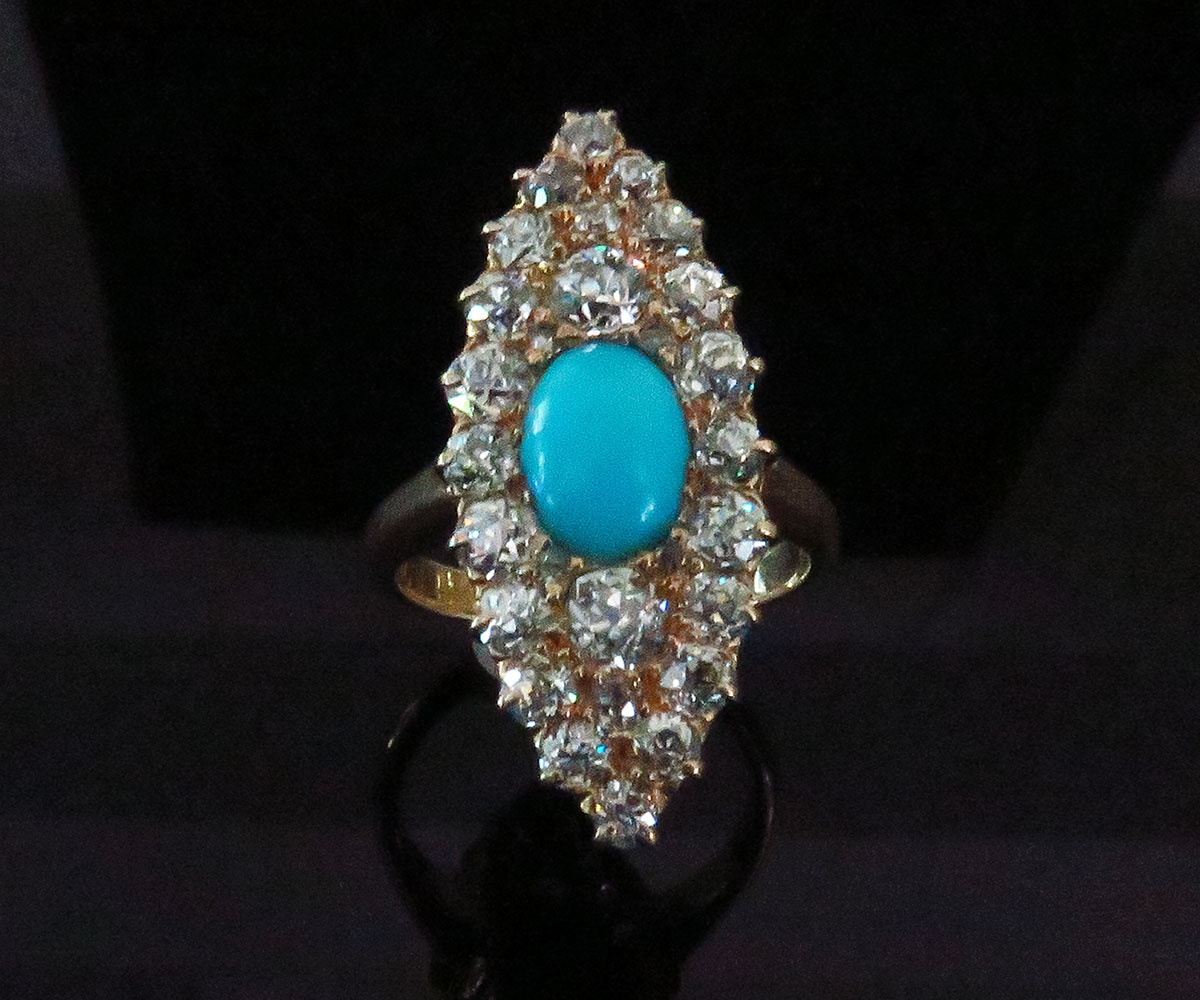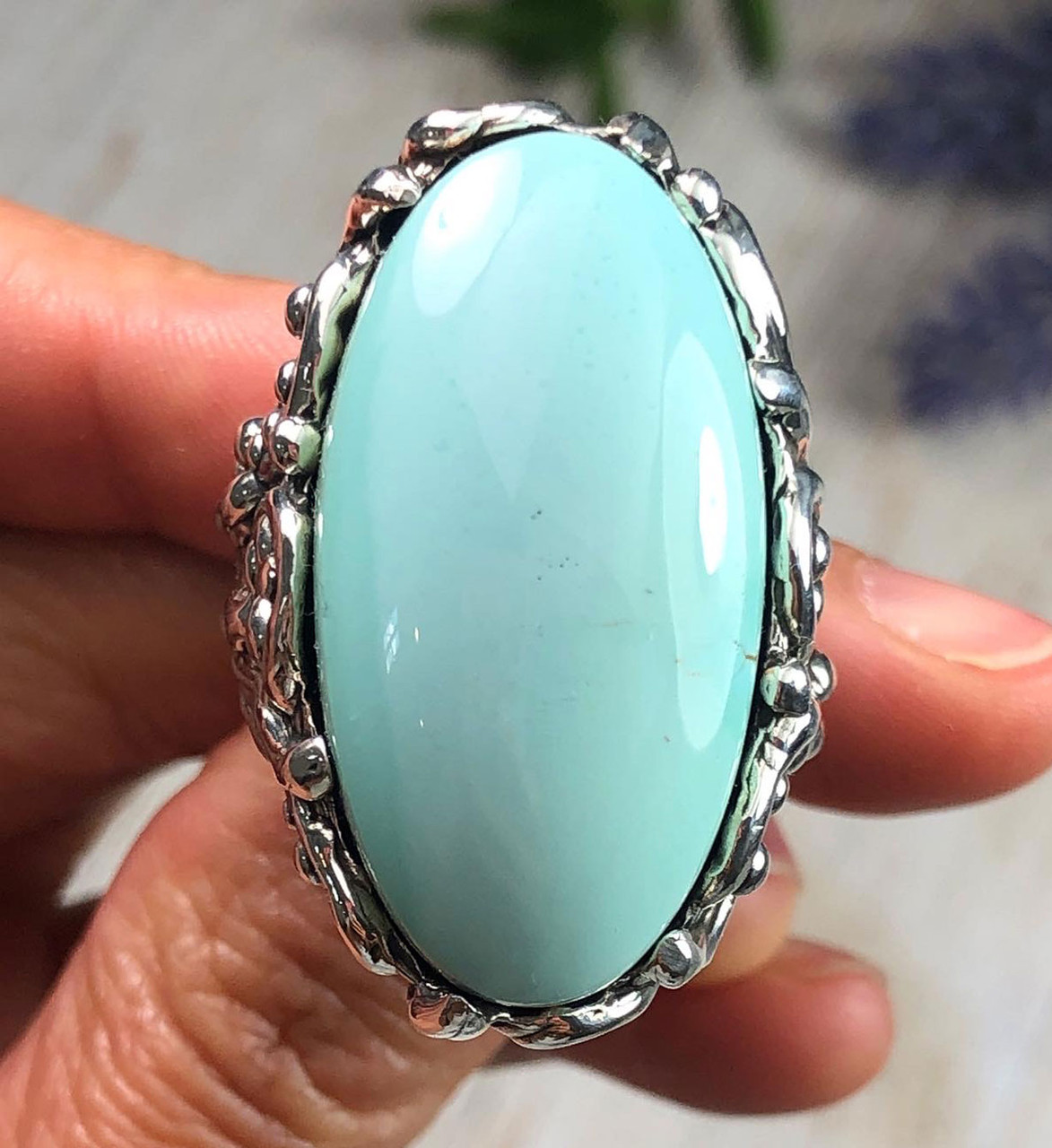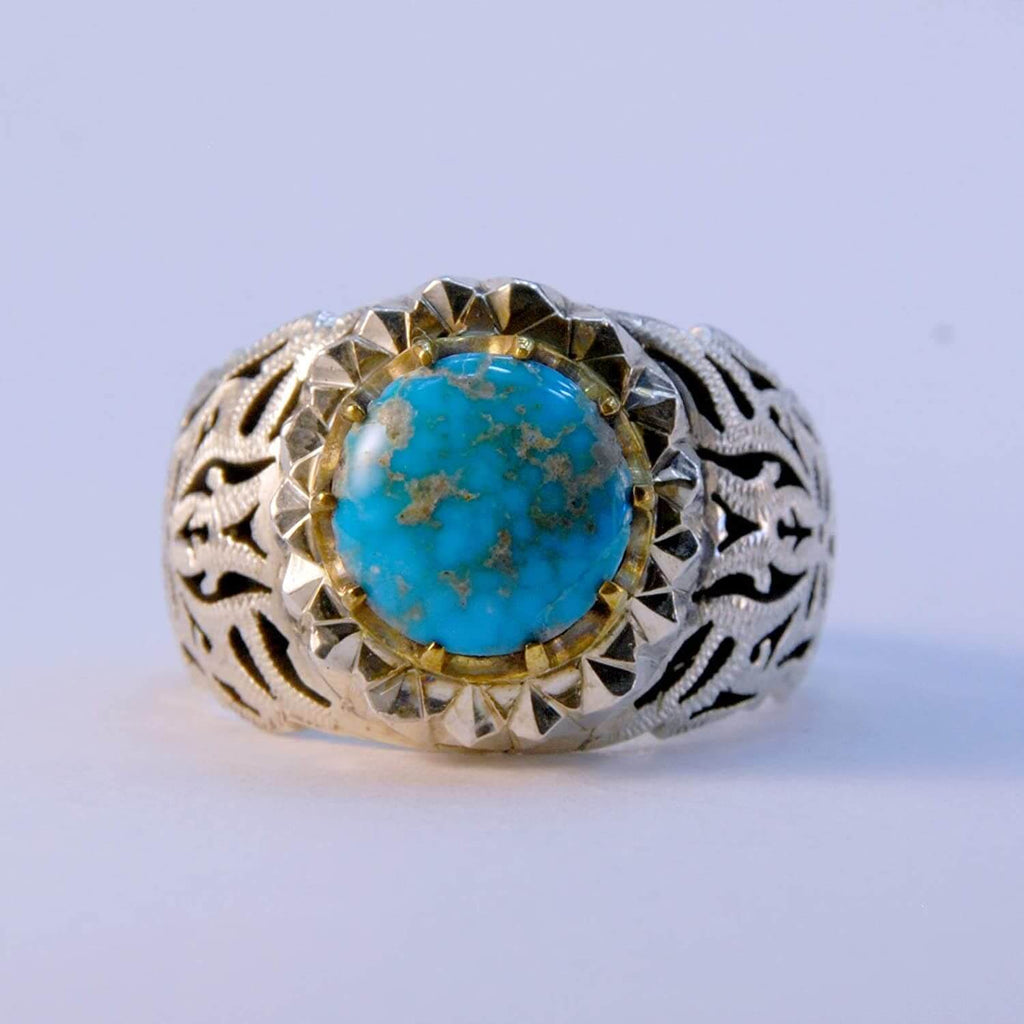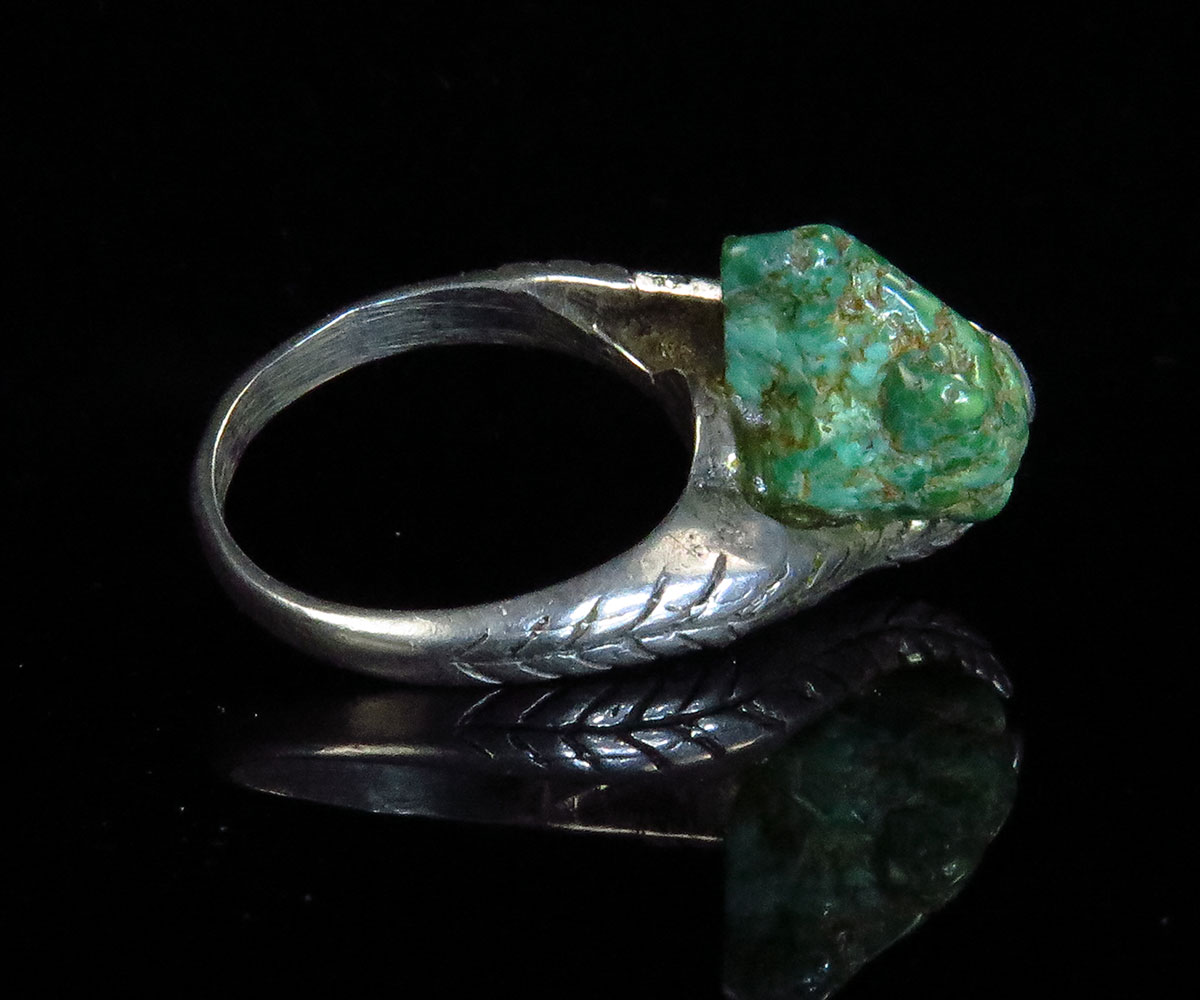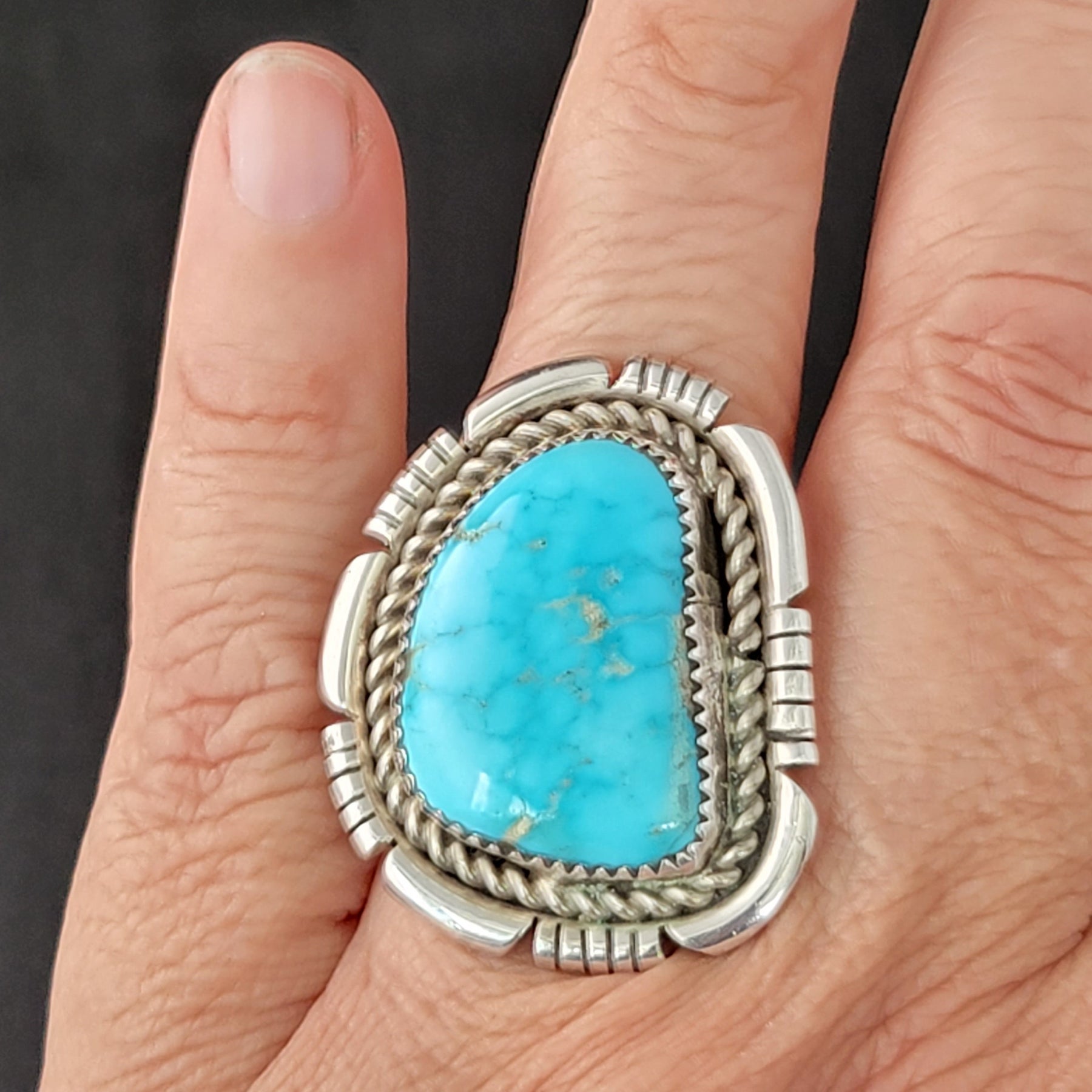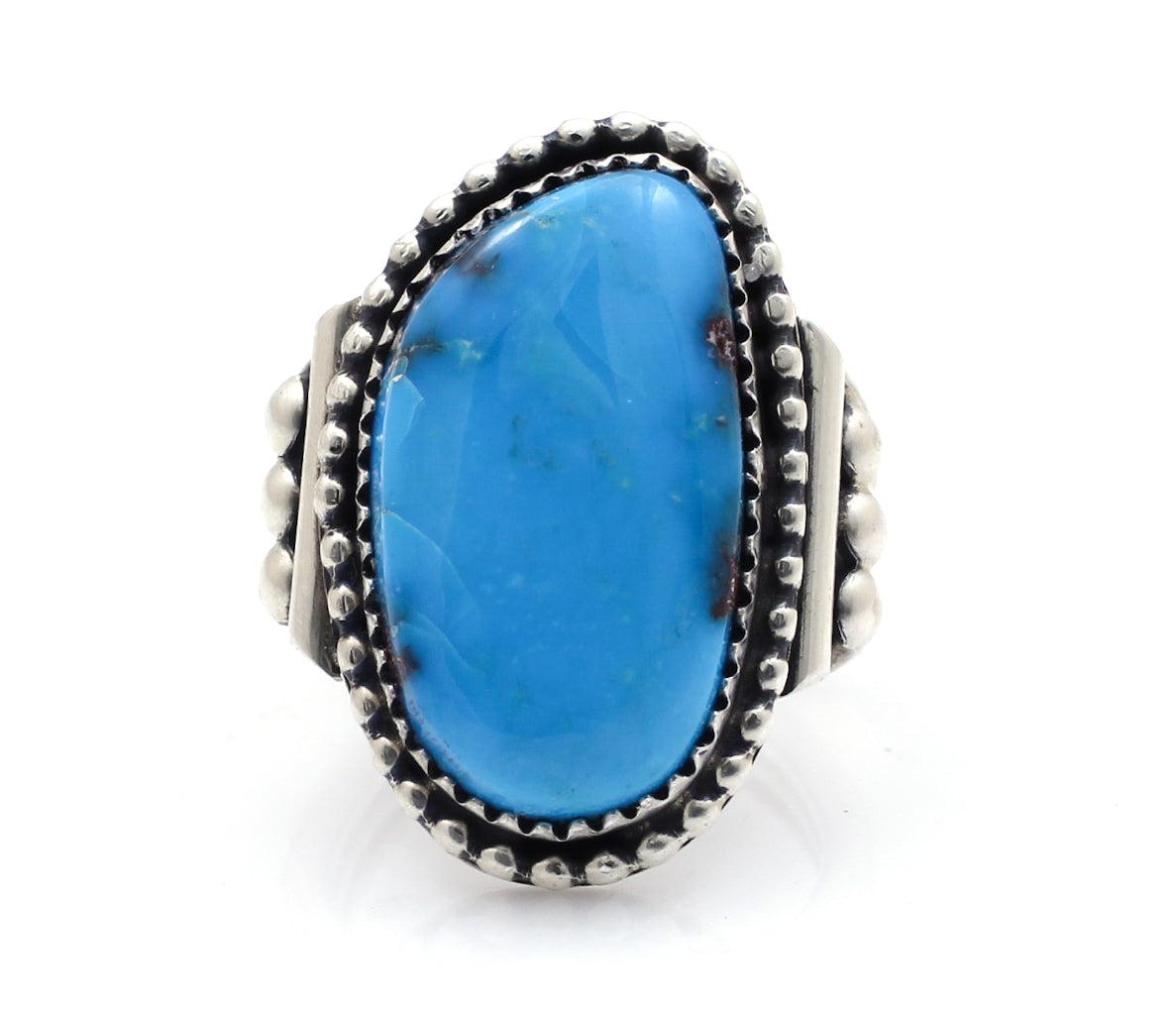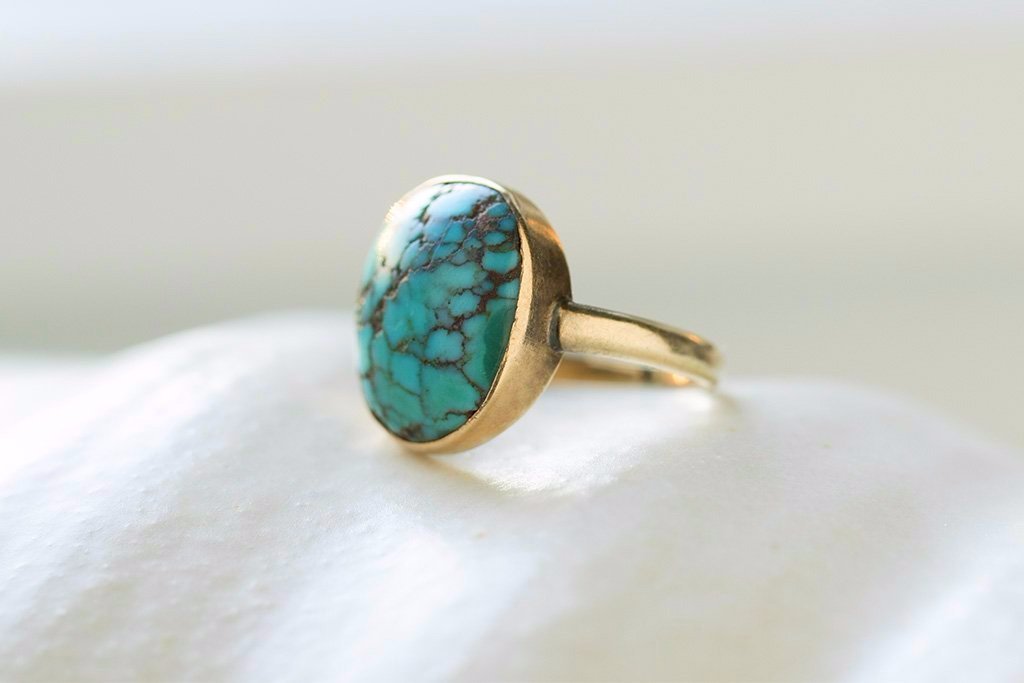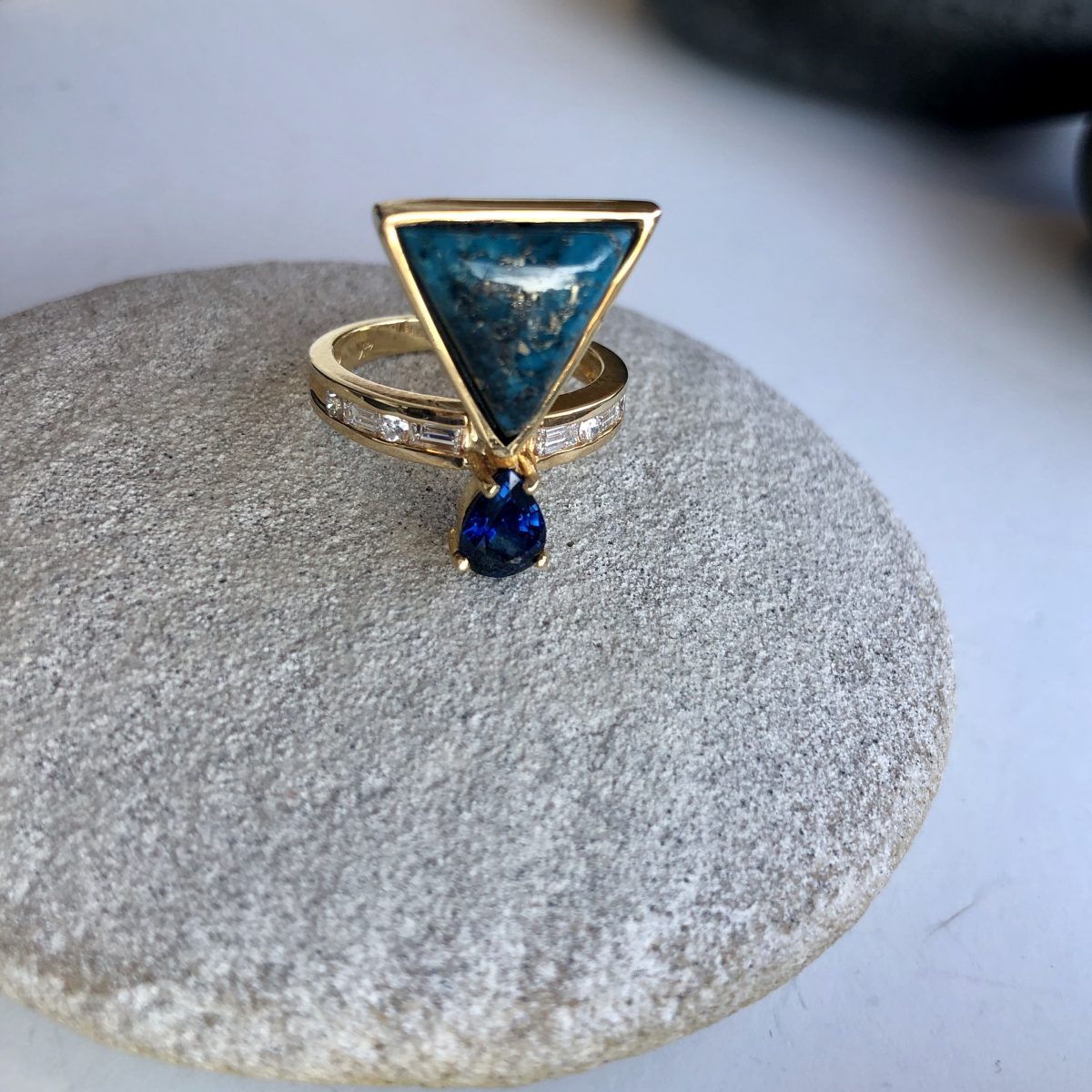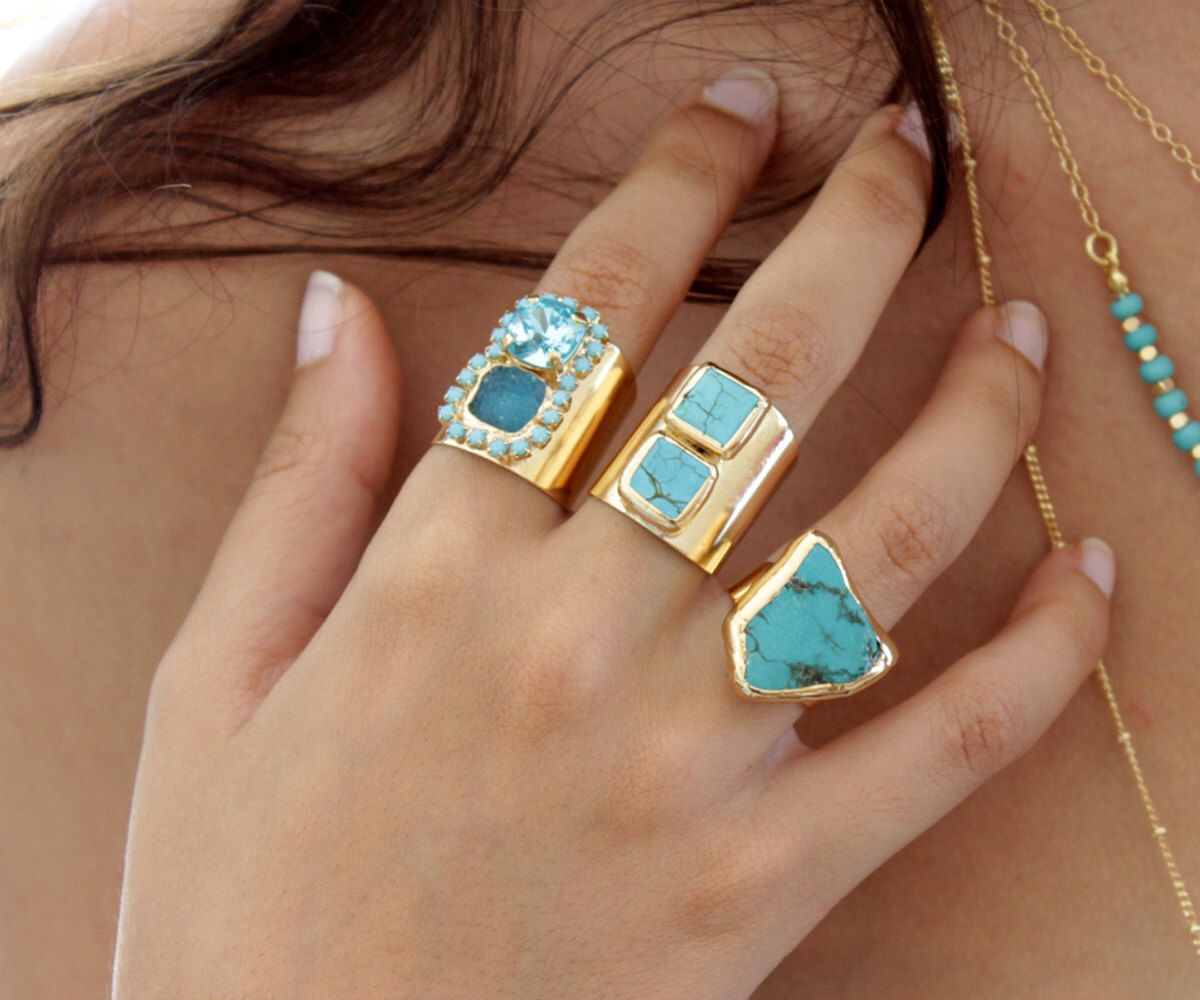
Turquoise, with its captivating blend of vibrant blue and green hues, has captivated humanity's imagination for millennia. This exquisite gemstone, steeped in history and cultural significance, has found its place in the world of jewelry, adorning fingers with elegance and grace. In this exploration of turquoise rings, we embark on a journey to uncover the unique charm and allure of these jewelry pieces.
From their origins to their symbolism and style, turquoise rings offer a story as rich and colorful as the gemstone itself. Whether you're considering turquoise for your next jewelry acquisition or simply want to appreciate the beauty and significance of this gem, this journey into the world of turquoise rings promises to be an enlightening and enchanting one.
History Of Turquoise Rings
Throughout history and across a wide range of civilizations, rings have been associated with mysticism and symbolism. The cycle of life and unending lovehave been symbolized by the circular form.
The practice of exchanging rings dates back more than 6,000 years. Giving turquoise jewelry as a gift is believed to bring luck and success. Native Americans are known to wear a large number of turquoise rings on each hand, making rings a popular and cherished item of jewelry to wear.
Typically, cabochon-set turquoise rings and more contemporary turquoise inlay rings are made by Navajo silversmiths. These rings with bezel settings might be plain split-shank designs or bedecked with hand-stamped, appliqué, or repousse work.
Some of our favorites are the turquoise band rings with inlays, and the turquoise bands we sell make excellent turquoise engagement rings and turquoise wedding bands.
The Zuni Indians are renowned for their exquisite stone-cutting skills and lapidary craftsmanship. They frequently use mother-of-pearl, coral, turquoise, and jet in their work. The needlepoint, tiny point, and inlaid turquoise rings made by Zuni silversmiths are well recognized.
The Meaning Of Turquoise Rings
Protection
Typically, Navajo silversmiths produce turquoise rings with cabochon settings as well as more modern rings with turquoise inlay. The split-shank designs of these bezel-set rings may be simple or embellished with hand-stamped, appliqué, or repousse work.
The turquoise bands we sell make fantastic turquoise engagement rings and turquoise wedding bands. Some of our favorites are the turquoise band rings with inlays.
The Zuni Indians are renowned for their fine lapidary workmanship and excellent stone-cutting techniques. Mother of pearl, coral, turquoise, and jet are materials they regularly use in their artwork. The Zuni silversmiths' needlepoint, small point, and inlaid turquoise rings are highly known
The Turks and Persians also believed turquoise to have protective powers. Ancient jewelry-making practices in Turkey and Persia also revealed a passion for turquoise. The Persians used it to embellish their horse reins and daggers. Persian women wear turquoise gemstone jewelry around their necks and headscarves. They believe that altering color to warn of impending disaster, offers protection.
Purification
The stone of purification is turquoise. It acts as a natural defense mechanism against anything harmful to your body, mind, or well-being. It can get rid of bad energy and can be worn to shield against outside influences or air pollution.
Turquoise is a relaxing stone that can promote inner tranquility and lessen mental fatigue. All chakras are balanced and adjusted by turquoise, which also helps to calm mood swings and promote inner peace. Turquoise is thought to aid in the body's detoxification process as well as clearing the mind of any unpleasant feelings.
Wisdom
According to legend, turquoise contains profound truth and insight. Particularly, turquoise is a stone of self-realization and aids in problem-solving creativity. The sea green stone in particular serves as a reminder of the importance of the event for every one of us.
Other Meanings
Sea-green stones are worn by Greek girls as a purity symbol. At the same time, girls in the UK gave turquoise to their lovers as a representation of enduring love. Blue-green stones are also a symbol of love in Russia.
Many married couples include them in their wedding bands. The progressive transformation of turquoise from blue to green when worn in Tibet represents the growth of wisdom and the cycle of life and death, both of which are essential to their faith. In addition, turquoise jewels represent friendliness and provide harmony to the family and good fortune to the wearer.
Collection Of Top Turquoise Rings For You
Turquoise rings come in a variety of types, each distinguished by its unique characteristics, origins, and style. Let's delve into the details of some of the most popular types of turquoiserings.
Sleeping Beauty Turquoise Rings
Mined in the Sleeping Beauty mine in Globe, Arizona, this turquoise variety is renowned for its pure, robin's egg blue color with minimal matrix. Sleeping Beauty turquoise is known for its brilliant, uniform blue hue, making it highly sought-after in the jewelry world.
Rings featuring Sleeping Beauty turquoise often showcase the gemstone in its full glory, typically in settings that emphasize the stone's color and clarity.
Persian Turquoise Rings
Historically mined in Iran (formerly known as Persia), Persian turquoise is celebrated for its deep blue and green shades. Persian turquoise is known for its rich, intense coloration and often features intricate matrix patterns.
Rings adorned with Persian turquoise are prized for their luxurious and classic appearance, making them highly desirable among collectors.
American Turquoise Rings
The United States boasts several turquoise mining regions, including Arizona, New Mexico, and Nevada, known for producing various types of turquoise. American turquoise comes in a wide range of colors, from bright blue to greenish-blue, and can feature a diverse array of matrix patterns.
Rings featuring American turquoise often reflect the unique characteristics of the region where the turquoise was mined, offering a diverse selection of styles to choose from.
Kingman Turquoise Rings
Mined in the Kingman mine in Arizona, Kingman turquoise is celebrated for its vibrant blue and green colors and distinctive matrix. Kingman turquoise can exhibit a range of blue and green hues and is often favored for its striking appearance.
Rings with Kingman turquoise are prized for their bold and eye-catching designs, often featuring intricate silverwork.
Bisbee Turquoise Rings
Mined in the Bisbee mine in Arizona, Bisbee turquoise is known for its rich, deep blue colors and intricate matrix. Bisbee turquoise is celebrated for its deep, almost royal blue hues and unique matrix patterns that can range from golden to brown.
Rings showcasing Bisbee turquoise are highly sought after for their exceptional quality and striking coloration, often complemented by intricate silveror goldsettings.
Matrix-Free Turquoise Rings
Some turquoise rings are crafted from high-quality stones that are relatively matrix-free, allowing the vibrant blue and green colors to take center stage. Matrix-free turquoise rings often feature clean, contemporary designs that highlight the gemstone's pure color and clarity.
Artisan And Vintage Turquoise Rings
These rings are often handmade by skilled artisans or are vintagepieces that showcase the craftsmanship of a bygone era. Artisan and vintage turquoise rings can vary widely in style, from traditional Native American designs to contemporary and eclectic creations
Characteristics Of Turquoise Rings
Turquoise rings possess several distinctive characteristics that make them highly sought-after and cherished by jewelry enthusiasts. Here are the key characteristics of turquoise rings:
Vibrant Color
Turquoise is known for its captivating blue-green color, which varies in intensity from light sky blue to deep greenish-blue. The color can evoke a sense of calm, tranquility, and natural beauty, making it a beloved choice for jewelry.
Matrix
Many turquoise stones feature intricate matrix patterns, which are the host rock or mineral veins that run through the gem. These matrix patterns add character and uniqueness to each stone, making every turquoise ringone-of-a-kind.
Softness
Turquoise is relatively soft compared to other gemstones, with a hardness rating of 5 to 6 on the Mohs scale. This softness can make turquoise susceptible to scratches and damage if not handled with care.
Polish And Luster
When properly polished, turquoise exhibits a glossy, waxy, or sometimes even glassy luster that enhances its visual appeal. This luster adds to the stone's overall beauty.
Variety Of Origins
Turquoise is mined from various regions around the world, including the United States (Arizona, Nevada, New Mexico), Iran (Persian turquoise), China, and more. Different mines produce turquoise with distinct characteristics, colors, and matrix patterns.
Symbolism And Cultural Significance
Turquoise has a rich history of cultural and spiritual significance in many societies. It is often associated with protection, healing, and well-being. It has been used in amulets, talismans, and jewelry for its symbolic value.
Versatility In Design
Turquoise rings come in a wide range of designs, from classic and simple to intricate and ornate. This versatility allows individuals to choose a ring that suits their style and preferences.
Historical And Vintage Value
Vintage and antique turquoise rings hold historical and sentimental value, often reflecting the craftsmanship and design trends of their era. They can be prized as heirlooms and unique pieces of jewelry history.
Natural Variations
Turquoise's natural variations in color, matrix patterns, and texture make each ring a distinctive work of nature. These variations add to the stone's charm and uniqueness.
Preservation Of Turquoise Rings
Preserving the beauty and durability of turquoise rings requires special care due to the unique characteristics of turquoise, such as its relative softness and sensitivity to certain substances. Here are some preservation tips to ensure your turquoise ring remains in excellent condition:
Avoid Chemicals
Turquoise is sensitive to chemicals and can easily be damaged by them. Avoid contact with household chemicals, cleaning agents, and beauty products such as perfumes, lotions, and hairsprays. These substances can discolor or harm the stone.
Moisture Protection
Turquoise is porous and can absorb moisture, which may cause discoloration or damage. Remove your turquoise ring before swimming, bathing, or engaging in activities where it might come into contact with water.
Limit Sun Exposure
Prolonged exposure to direct sunlight can fade the color of turquoise over time. Store your ring away from direct sunlight and extreme heat to preserve its vibrant hues.
Avoid Abrasion
Turquoise is relatively soft, so it can be scratched or damaged by harder materials. Store your turquoise ring separately from other jewelry to prevent scratches, and avoid wearing it when engaging in activities that might cause impact or abrasion.
Gentle Cleaning
To clean your turquoise ring, use a soft, damp cloth or a jewelry cleaning cloth to wipe away dirt and oils. Be gentle, and avoid scrubbing. Never use abrasive materials, brushes, or ultrasonic cleaners, as they can damage the stone.
Storage
When not wearing your turquoise ring, store it in a soft pouch or a jewelry boxwith individual compartments. This prevents it from coming into contact with other jewelry and reduces the risk of scratching.
Rehydrate
Turquoise can dry out over time, leading to a loss of color and vibrancy. To rehydrate the stone, gently wipe it with a damp, clean cloth and allow it to air dry. This can help maintain its natural luster.
Regular Inspections
Periodically inspect your turquoise ring for signs of damage, loose settings, or cracks in the stone. Early detection of issues can prevent further damage and allow for timely repairs.
Professional Care
If your turquoise ring requires cleaning, repairs, or resizing, it's advisable to seek the assistance of a professional jeweler experienced in working with turquoise. Attempting to repair or resize the ring yourself can lead to irreversible damage.
Rotate Your Jewelry
If you have multiple rings or pieces of jewelry, consider rotating them regularly. This allows each piece to "rest" and reduces the wear and tear on any one item.
FAQs
What Does A Turquoise Ring Symbolize?
Giving turquoise jewelry as a gift is believed to bring luck and success. Native Americans are known to wear a large number of turquoise rings on each hand, making rings a popular and cherished item of jewelry to wear.
Why Is Turquoise So Expensive?
Both gemologists and miners agree that more than 90% of the turquoise traded and sold today has undergone some sort of alteration. Because of its tremendous value as an investment, top-grade pieces are frequently three times more expensive than gold.
Is Wearing Turquoise Good Luck?
Beautiful turquoise stones in the color of sky blue are lucky in the eyes of many. Discover the mythology and symbolism of Native Americans and other cultures' use of turquoise.
What Are The Benefits Of Wearing Turquoise Rings?
When worn, turquoise is a stone that is said to have numerous positive effects. One of the most widespread misconceptions about turquoise and turquoise jewelry is that it provides a defense against evil.
Which Settings Best Suit Turquoise Rings?
The settings that keep the stone firmly in place work best for turquoise rings. Most turquoise stones are carved into cabochons because of the softness of these enticing jewels. This indicates that they have a domed top and a flat bottom.
Conclusion
Turquoise rings, with their rich history, cultural significance, and stunning beauty, continue to be treasured as timeless pieces of jewelry. Whether you're drawn to the spiritual aura of this gemstone or simply captivated by its vibrant colors, a turquoise ring is a symbol of enduring charm and elegance.
As you wear your turquoise ring, you carry with you the legacy of ancient civilizations, the beauty of nature, and a touch of the mystical, making it a truly enchanting accessory that stands the test of time.
